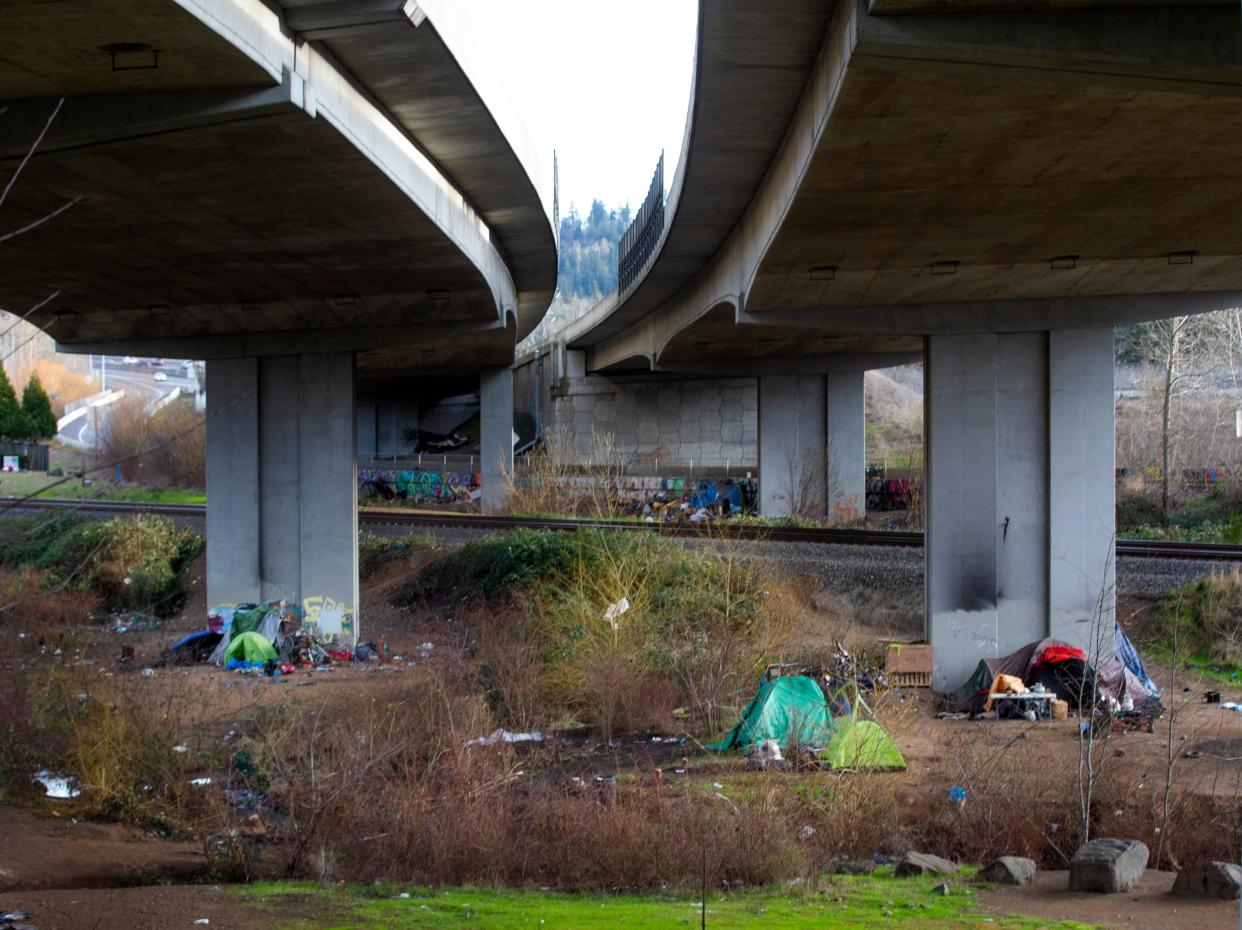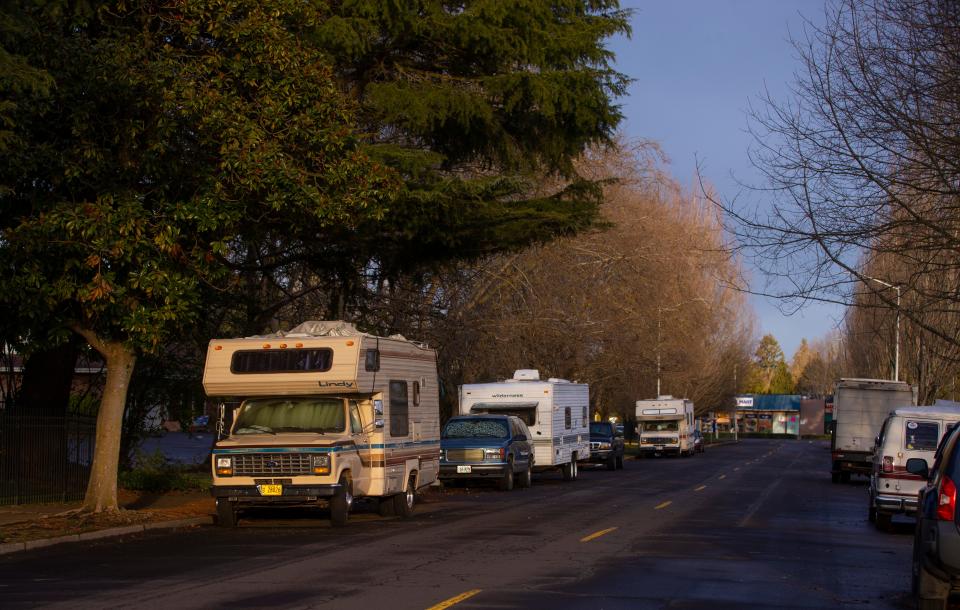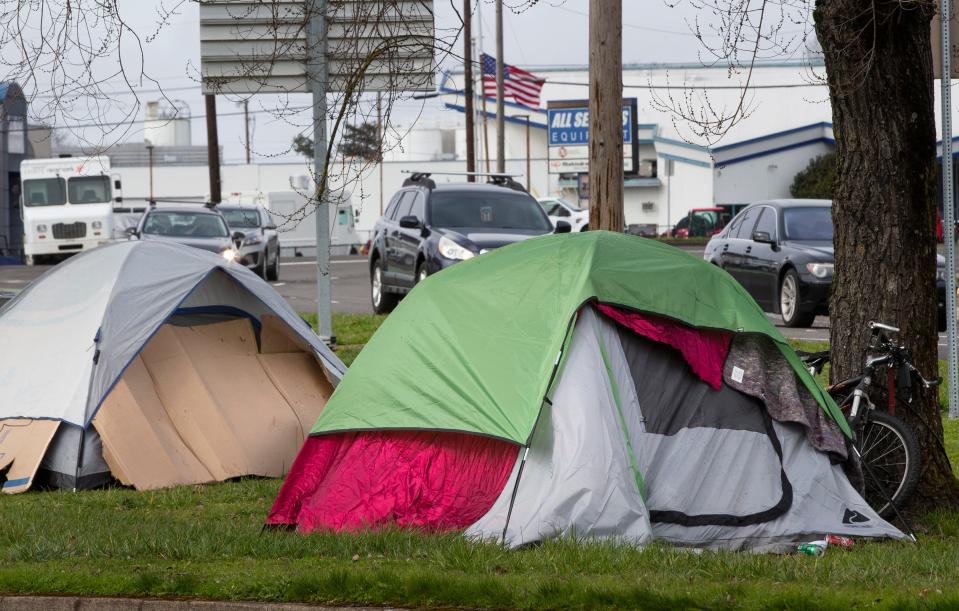How Eugene and Springfield may change their camping ordinances to comply with Oregon law

Eugene and Springfield officials want to protect waterways, sidewalk accessibility and more as they consider changes to ordinances about sleeping, sitting and lying on public property.
Councilors for both cities continued discussions this week about potential changes, inching closer to updated ordinances.
Cities across Oregon must update their ordinances by July, or otherwise ensure they comply with a state law passed in 2021. The law prohibits cities from banning camping or sleeping in public spaces, though it allows for regulations that most people, including those experiencing homelessness, would consider fair.
Officials in Eugene and Springfield must balance friction over the use of public spaces such as parks and sidewalks for things other than their traditional use and people’s need to sleep somewhere.
The changes are a "narrow slice" of a larger issue with several more parts, said Springfield City Attorney Mary Bridget Smith.
The changes would only apply to city-owned property that's open to the public, Eugene City Attorney Kathryn Brotherton told councilors Wednesday.
Springfield is moving faster than Eugene, with a public hearing set for April 17.
Eugene officials plan to hold another work session to discuss possible changes before holding a public hearing. Those meetings likely will take place in April and May.

Why cities have to change their camping and sleeping in public ordinances
Rulings in Martin v Boise and Blake v Grants Pass that favor people challenging camping bans found the Eighth Amendment means a governmental entity cannot “criminalize conduct that is an unavoidable consequence of being homeless – namely sitting, lying, or sleeping.”
The decision in Martin adds that reasonable restrictions based on where, when and how people use public spaces might be allowed and that full bans could be allowed if there is enough true access to shelter. That means there are enough shelter beds and there are no barriers to access.
The ruling in Blake adds it doesn’t matter whether a prohibition would mean a civil or criminal violation, and that people who must sleep outside can take minimal measures, such as using a sleeping bag or setting up a tent, to keep themselves warm and dry.
It also considers whether people don’t have access to shelter due to gender, age or another constitutionally protected attribute, a lack of sobriety or a criminal record.
House Bill 3115 followed the ruling in Martin and the initial decision in Blake.
The state law, passed during the 2021 Oregon Legislative, requires any city or county law regulating the acts of sitting, lying, sleeping or keeping warm and dry outside to be objectively reasonable to people, including those experiencing homelessness.
Cities can regulate when, where and how people sleep, sit, lie and keep warm and dry.
Changes Springfield is considering
Springfield councilors have previously expressed interest in some specific time, place and manner restrictions.
They’ve said they would like to regulate when people can camp by putting a 24-hour limit on staying in one place.
Officials also have indicated they want to prohibit camping in rights of way because of safety issues, limit sleeping on sidewalks to preserve accessibility and protect waterways and environmentally sensitive areas.
Councilor Joe Pishioneri asked Monday night about strengthening protections for greenways, which are spots of land dotting riverbanks.
Springfield also likely will limit the storage of personal property and require people to maintain distance from sites where others are sleeping.
Councilors said they don’t want to allow burning or warming fires and discussed lowering the standard fine for prohibited camping.
The current fine for prohibited camping is $720, Smith said. Lowering it could demonstrate the reasonableness of the regulations, she said. Councilors expressed interest in doing so because fines can further impede people experiencing homelessness from improving their situation.
Officials also asked about regulations on trash and debris. Councilor Victoria Doyle said a lot of the concerns she hears from people are about the mess people leave behind after camping or sleeping somewhere.
Changes Eugene is considering
Eugene staff presented potential changes based on overarching goals of accessibility, public health and safety, Brotherton said.
Potential amendments include prohibitions on camping on:
Roads and other public properties meant for vehicle traffic and in parking lots and on-street spaces.
Sidewalks when it isn’t possible to leave at least four feet for access and share-use paths when it isn’t possible to leave at least 10 feet.
Land adjacent to buildings if camping there would block access to the entrance, exit or stairs.
Property that’s within five feet of a waterway.
Proposed changes also would prohibit depositing, discarding or storing debris, human waste or other trash and would ban draining sewage, graywater or similar substances from a holding tank.
The proposed changes would not apply to properties closed to the public, Brotherton said. That means the city would still prohibit camping in areas that are not open to the general public, including parks when they're closed overnight.

Law enforcement would treat other properties the same as private property, Police Chief Chris Skinner said. That means Eugene police would need property owners, even the county and other public agencies, to submit a trespass letter before acting, he said.
Councilors indicated they’d like a larger buffer zone than five feet for waterways.
Some of them also asked for more clarity on what changes would mean for where people can and can’t camp.
Councilor Emily Semple said it would be good to have a “really specific list of where you can’t camp” but wondered what that would leave open for people to sleep.
“People don’t always think through a list of prohibitions,” Semple said. “They just want to know what they can do.”
Semple would like to see the regulations mapped out and said if the list of prohibitions is too “onerous,” people will ignore them.
Officials also asked about the city’s ability to enforce any new regulations.
The volume likely will remain overwhelming, Skinner said. Police don’t have the resources to get to everything now, he said, and that limitation wouldn’t change.
Councilor Randy Groves said the city needs to consider that and make sure regulations are enforceable and not just “one more rule on the books that’s just there on the books.”
What's next?
Springfield staff are drafting an ordinance and will bring it back for a public hearing on April 17.
Eugene will hold another work session on possible changes, likely in April. The council then would hold a public hearing on a draft ordinance in May.
Contact city government watchdog Megan Banta at mbanta@registerguard.com Follow her on Twitter @MeganBanta_1.
This article originally appeared on Register-Guard: Eugene, Springfield, Oregon may change camping ordinances

